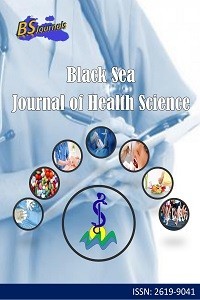Uzay Ortamında Öğrenme ve Belleğe Etki Edebilecek Bazı Faktörlerin İrdelenmesi
İnsanoğlu, antik çağlardan günümüze kadar uzayı daima merak etmiş ve gözlemiştir. Nihayet bu gözlemler, 1900’lü yılların başından itibaren uzaya gitmeye evrilmiştir. Soğuk savaş yıllarında, Amerikalıların ve Rusların karşılıklı hamleleriyle başta yörüngeye, uydu, hayvan, insan gönderilmiş ve en nihayetinde aya insan gönderilerek bu yarış çok büyük bir ivme kazanmıştır. Uzay, yeryüzünde yaşayan (tüm evrimsel süreçlerini dünyada gerçekleştiren) insan için ekstrem bir ortamdır ve uzaya giden insanları (astronot ve kozmonotlar) fizyolojik ve psikolojik olarak etkilemektedir. Bu derlemede; öğrenme ve bellek süreçlerine mikrogravitenin (buna bağlı olarak ortaya çıkan ağırlıksızlık), radyasyonun (kozmik radyasyon, güneş patlamaları, vs) izolasyonun ve bazı diğer faktörlerin (cinsiyet, kültür ve dil gibi) etkileri irdelenmeye çalışılmıştır.
Examination of Some Factors That May Affect Learning and Memory in the Space Environment
Mankind has always wondered and observed space from ancient times to the present. Finally, these observations have evolved to go into space since the early 1900s. During the Cold War years, with the mutual moves of the Americans and the Russians, satellites, animals, and humans were sent to orbit, and finally, humans were sent to the moon and this race gained a great momentum. Space is an extreme environment for human beings living on earth (who performs all their evolutionary processes on earth) and it affects people who go to space (astronauts and cosmonauts) physiologically and psychologically. In this review; the effects of microgravity (the resulting weightlessness), radiation (cosmic radiation, solar flares, etc.) isolation and some other factors (such as gender, culture, and language) on learning and memory processes have been tried to be examined.
___
- Brem C, Lutz J, Vollmar C. 2020. Changes of brain DTI in healthy human subjects after 520 days isolation and confinement on a simulated mission to Mars. Life Sci Space Res, 24: 83-90
- Cekanaviciute E, Rosi S, Costes SV. 2018. Central nervous system responses to simulated galactic cosmic rays. Int J Mol Sci, 19: 1-14.
- Clément G, Reschke MF. 2008. Neuroscience in space. Springer, NewYork, US, DOI: 10.1007/978-0-387-78950-7.
- Clément G. 2007. Using your head: cognition and sensorimotor functions in microgravity. Gravitat Space Biol, 20: 65-78.
- Connors MM, Harrison AA, Akins FR. 1986. Psychology and the resurgent space program. Am Psychol, 41: 906-913.
- DeRoshia CW, Greenleaf JE. 1993. Performance and mood-state parameters during 30-day 6 degrees head-down bed rest with exercise training. Aviat Space Environ Med, 64: 522-527.
- Garrett-Bakelman FE, Darshi M, Green SJ, Gur RC, Lin L, Macias BR. 2019. The NASA twins study: a multidimensional analysis of a year-long human spaceflight. Science, 364: 8650.
- Kanas N, Manzey D. 2008. Space psychology and psychiatry. Springer, California, US, pp: 240.
- Kiffer F, Boerma M, Allen A. 2019. Behavioral effects of space radiation: Acomprehesive review of animal studies. Life Sci Space Res, 21: 1-21.
- Koppelmans V, Mulavara AP, Yuan P, Cassady KE, Cooke KA, Wood SJ. 2015. Exercise as potential countermeasure for the effects of 70 days of bed rest on cognitive and sensorimotor performance. Front Syst Neurosci, 9: 121.
- Krukowski K, Grue K, Frias ES, Pietrykowski J, Jones T, Nelson N, Rosi S. 2018. Famale mice are proceted from space radiation-induced maladaptive responses. Brain Behav Immunity, 74: 106-120.
- Lipnicki DM, Gunga HC. 2009. Physical inactivity and cognitive functioning: results from bed rest studies. Eur J Appl Physiol, 105: 27-35.
- Mammarella N. 2020. The effect of microgravity-like conditions on high-level cognition: A review. Front Astron Space Sci, 7(6): 1-5.
- Marishchuk VL, Dzhamgarov TT, Dem’Yanenko YK, Stupnitskiy VP, Hvoynov BS. 1970. Stability of psychic functions during prolonged confinement to bed. Probl Space Biol, 13: 175-180.
- Pavy Le-Traon A, Rous De Feneyrols A, Cornac A, Abdeseelam R, N’uygen D, Lazerges M. 1994. Psychomotor performance during a 28-day headdown tilt with and without lower body negative pressure. Acta Astronaut, 32: 319-330.
- Schneider S, Brümmer V, Carnahan H, Kleinert J. 2010. Exercise as a countermeasure to psycho-physiological deconditioning during long-term confinement. Behav Brain Res, 211(2): 208-214.
- Seaton KA, Slack KJ, Sipes W, Bowie K. 2007. Artificial gravity as a multi-system countermeasure: effects on cognitive function. J Gravit Physiol, 14: 27-30.
- Shehab RL, Schlegel RE, Schiflett SG, Eddy DR. 1998. The NASA performance assessment workstation: cognitive performance during head-down bed rest. Acta Astronaut, 43: 223-233.
- Storm WF, Giannetta CL. 1974. Effects of hypercapnia and bedrest on psychomotor performance. Aerosp Med, 45: 431-433.
- Wollseiffen P, Vogt T, Abeln V, Struder HK, Askew CD, Schneider S. 2016. Neuro-cognitive performance is enhanced during short periods of microgravity. Physiol Behav, 155: 9-16.
- Zubek JP, MacNeill M. 1966. Effects of immobilization: behavioural and EEG changes. Can J Psychol, 20: 316-336.
- Yayın Aralığı: Yılda 4 Sayı
- Başlangıç: 2018
- Yayıncı: Cem TIRINK
Sayıdaki Diğer Makaleler
Geçmişten Geleceğe Anatomi Eğitimi
Engin ÇİFTCİOĞLU, Zeynep ALTUNTAŞ, Ezgi ÇİFTCİOĞLU
Türkiye'de Ağrıya Yönelik Reiki Uygulaması İle İlgili Yapılmış Hemşirelik Tezlerinin İncelenmesi
Patellofemoral Ağrı Sendromu Tedavisinde Son Beş Yılda Kanıta Dayalı Yeni Fizyoterapi Yaklaşımları
Musa ÇANKAYA, İlkim ÇITAK KARAKAYA
Mahmut EVLİ, Nuray ŞİMŞEK, Ömer ÖDEK
Şahika ŞİMŞEK ÇETİNKAYA, Demet GÜNEY
Uzay Ortamında Öğrenme ve Belleğe Etki Edebilecek Bazı Faktörlerin İrdelenmesi
Güney GÜRSOY, Meric ESMEKAYA, Zehra ÇİÇEK
Dudu ALPTEKİN, Derya GEZER, Esma GÖKÇE, Hamide ŞİŞMAN, Refiye ÖZGEN, Sevban ARSLAN
Time-Dependent Receiver Operating Characteristic Analysis and Applications in the Field of Medicine
